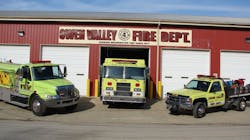IN Fire Territory's Move to Career FFs Stirs Debate
SPENCER, IN—The new year will bring changes in the way fire protection is provided in the town of Spencer and surrounding Washington Township, as the Owen Valley Fire Territory’s plan to replace volunteers with paid firefighters moves forward.
The proposal has ignited a debate between members of Owen Valley Volunteer Firefighters Inc.—a group of 25 or so volunteers the fire territory board pays to respond to fires and traffic accidents—and fire territory board members who support the transition to paid professional firefighters.
“We’ve been trying to negotiate with the territory board for several months,” said Bill Snodgrass, president of the Owen Valley firefighters group. He said that during a meeting early this year, the two sides met and agreed “to work together and get this accomplished.”
Spencer resident and attorney Terry English represents the fire territory board. He said the fire territory has contracted with the firefighters’ group annually to provide volunteers, who receive an annual $200 stipend for clothing and travel costs.
“Up until this point in time, we have paid up to 60 to 80 thousand dollars per year, and have not asked questions about how it is spent,” English said. “It has always been a matter of negotiation.”
The fire territory is financed by about $335,000 a year in taxes. The money is used for equipment, fire station upkeep, insurance, training and other expenses — among them funding for the firefighters’ annual contract.
But things were different this year. The volunteers say that when they presented their contract for 2020, the terms were rejected, and that the counter-proposal would not fly. English said that since the fire territory board will be investing more money in hiring paid staff, fewer volunteers will be needed.
“The fire territory attempted to work out an agreement with the volunteers to cut back on the amount we have been paying them, in order to move toward a professional fire company,” he said. “If they say we are locking them out, that’s not exactly the case.”
Snodgrass has a different perspective.
“In June, they had a meeting during the day during the week and they hired Lee Freeman as their full-time chief. He was our chief and our part-time employee. We kept going to them and saying, ‘Hey, we want to work with you, we want to work toward this.’ ”
Snodgrass said he told the fire territory board that the volunteers needed at least a year to change their organization’s bylaws and focus for the changes toward a paid force. “And they just went ahead and did it,” he said, “and pulled the plug and did it in June.”
He said the fire territory presented an amendment to the existing contract “that took all of the authority over all of the firefighters and gave it to the chief and went against our bylaws,” Snodgrass said. “Obviously, we can’t do that.”
The contract change would have reduced the volunteers’ $80,000 for 2020 by $44,000, which is the amount of Freeman’s fire chief salary. “We turned it down, and that really aggravated the fire territory board, I think,” Snodgrass said. “Since then, the communication has been non-existent.”
When the firefighters’ organization balked at the contract terms and refused to sign, the fire territory established a new volunteer firefighting force it says will replace the current one.
“We are in the process of organizing a second volunteer fire department, and its members will be those not happy with the management of the Owen Valley fire department as it exists right now,” English said.
He speculated that with paid firefighters joining the ranks, alongside trained volunteers, fire insurance rates may remain unchanged.
But some firefighters and citizens question that, fearing that Insurance Services Office ratings likely would change and cause rate increases for home and business owners.
Many of the current volunteers are career firefighters, and several have college degrees in public safety. Local firefighter Joe Frye pointed out that collectively, the fire force has thousands of hours in training and years of service.
English acknowledged the disgruntlement among volunteers about the new direction and the changes that seem to be a done deal. “I have heard that a number of firefighters have cleaned out their lockers. They may be angry about the way it is going, but this is the way the fire territory has chosen to proceed.”
He said the fire territory board wants to secure a firefighting force for the future. The youngest department members are in their 30s, and most are a decade or two older. English said young people are not joining the ranks as they once did.
“Millennials have dropped out of the picture,” he said. “Across the U.S., fire departments are having problems recruiting volunteer firemen. What we are not seeing is the 18-year-olds coming in to be trained. We can’t stand around and wait for them to show up.”
Earlier this month, two part-time paid firefighters joined the department, and there are plans for another full-time and one part-time employee.
English said the fire territory board “has made a conscious decision it wants to move toward paid firemen — not volunteers who get paid a stipend.”
The Owen Valley Fire Territory Board is scheduled to meet at the fire station in Spencer on Jan. 13 to implement the changes. English said anyone who wants to speak at the public meeting should contact Spencer Town Hall at least 10 days before that date.
But the board members likely will listen but not engage with citizens, he said, since they already have agreed on how they will proceed.
“It’s a nasty mess,” Snodgrass said. “We’ve kept it quiet and kept it out of the paper on purpose because we didn’t want to be slinging mud.”
———
©2019 the Herald-Times (Bloomington, Ind.)
Visit the Herald-Times (Bloomington, Ind.) at www.heraldtimesonline.com
Distributed by Tribune Content Agency, LLC.
